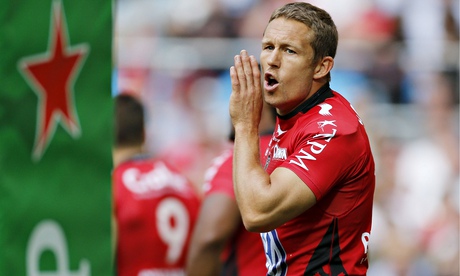
No doubt someone somewhere has a date and a place. We are all Jonny watchers after all. When and where did he begin, at that point so peculiar to him – when his concentration on the ball about to be kicked reaches the point of adoration – to puff air upwards, his bottom lip protruding? Is it a late adaptation to rugby on the Côte d'Azur, a little French air conditioning to soothe his Surrey cheeks in the heat of the Mayol in Toulon?
Perhaps somebody will ask him on the eve of his retirement, and perhaps that somebody will stay with the answer. That's far from a given. There is a sense of mischief to Jonny, an impishness beneath his angelic appearance and on-field equability, that manifested itself in a sentence yet to be ended. Not long after he first came to the notice of anyone bar Sir Clive Woodward – by missing all his kicks in the gruesome night in Brisbane, the 76-0 defeat to Australia on England's Tour of Hell in 1998 – he decided that he was in a cruel business and that those that were to feed on him – us, the media – were to be treated with the utmost suspicion. He kept his mask of earnestness on, and politely spoke … but what he started to say back then has yet to find the relief of a full stop. He rambled – his game within his game – as well for his country as he played rugby.
Much of his waffling had to do with his obsessive routines on the training ground. First to arrive, last to leave – all that sort of stuff. It gave the impression that here was a precision-made machine, the excavator of a groove so deep that whatever the strain of the occasion his technique would hold up. It also rather sold the idea of somebody deliberately holding in check any temptation to go off message. Any inclination to live a little on the wild side.
That made him an outside-half very much of Surrey stock. Or definitely not Welsh. In Wales, where the No10 truly is an object of adoration, there has to be something a bit flash, a touch of daring and a delight in leaving bodies sprawling. Perhaps Jonny never quite had the legs to do that, to dart and accelerate like Cliff Morgan, Barry John, Phil Bennett or Jonathan Davies.
Or perhaps he understood only too well the changing nature of his workplace. The professionalisation of rugby improved defences to the point where the half-gaps so dear to outside-halves were sealed, and he had to adapt. He became not a runner but the most voracious tackler ever to have been handed the shirt hitherto reserved for players permitted to decline their turn at making contact with another human. Tackling would cost him feeling in his shoulders, but, my, he was dementedly good at it.
And anyway, the impression he gave – like the sentences he never concluded – did not furnish the whole truth. Just when it seemed that Jonny was a little too self-controlling, a little too buttoned up, he would dink a little chip over the Irish defence, pursue it, gather and score. He would suggest that the kick was not aimed for himself, but that made it even better – an improvisation leading to an improvisation.
The way he dived for the line in his comeback game against Scotland was pure desire and instinct. He might claim that the swapping of the ball from one hand to the other was textbook stuff, but given the constraints of the corner and defenders it was born not of the manual, but of intuition.
He might claim that his finest moment, the drop goal that won England the World Cup in 2003, was a product of training ground rituals – to add reliability to his weaker foot. But to drop the ball unhesitatingly, against all the messages of fatigue and the very enormity of the moment, was a stroke of natural-born wonder.
How good would he have been had his career not been ravaged between 2003 and 2007? It's a tough one to answer, because the player who overtook him in the history book, one Dan Carter, has been similarly undone by injury. In the old rugby world, space was almost subconsciously permitted to the 10s, an invitation in a more romantically inclined age to them to strut their stuff if they dared. In a less generous age, the best in the world have rewritten their manual. To witness two such players has been to see the process of accelerated evolution.
Bald facts – their tallies of penalties and points – do not give the full picture. The gallery is not to be trusted. Jonny's self-portrait is misleading. He painted himself as a metronome and it was tempting to believe he was an automaton, but he was essentially unmanufactured. He was so odd, so different, he had to be a one-off. He began a sentence in the late 1990s and his career will end before it does. He has been fully in charge of that misrepresentation, too.
Is there deception here? Not in any malicious sense. Far from it. When Jonny Wilkinson stands before the ball and raises his eyes to the posts and puffs air upwards, his is not the only display of adoration. We've all watched Jonny and we've all adored him, the strange little darling.

